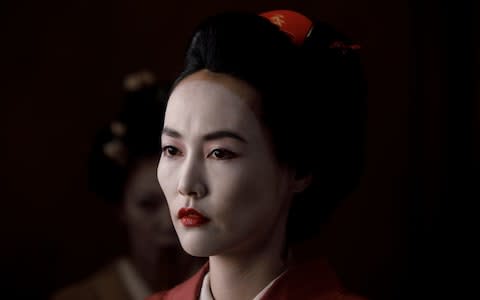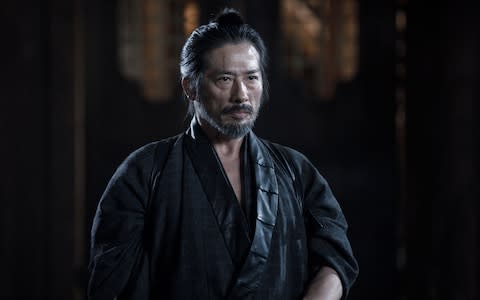Westworld, series two episode five recap: we're finally in Shogun World and Maeve's speaking a whole new language

I’ve a feeling we’re not in Westworld anymore. Or at least we’re not in the “West” part of Westworld. I may or may not have used those opening lines in a review discussing the Raj World-set story a few weeks back – but if we learnt one thing from this latest episode, it’s that writers on a deadline can’t help but self-plagiarise. A large part of this week’s narrative was set in the long-promised Shogun World section of the park, an excitingly unfamiliar, fantastically gory place – created, we were told, for guests who found the original park a tad too tame. Thanks to perpetually astounded fish-out-of-water writer Lee Sizemore (Simon Quarterman) and his apparent inability to come up with more than a dozen or so stock characters, however, things soon started to feel all too familiar.
Maeve (Thandie Newton), Hector (Rodrigo Santoro) and Armistice (Ingrid Bolsø Berdal) were confronted with their Shogun-world counterparts, including Akane, a sharp-tongued Madam with a secret soft spot, played by Japanese actress Rinko Kikuchi. Unsurprisingly, she and Maeve were quick to bond – especially after it was revealed that Akane, too, had a “daughter”, or at least a daughter surrogate: a vulnerable and beautiful young dancer she had sworn to protect. We were even treated to an atmospheric flute rendition of Paint It Black. Just in case the parallels weren’t clear enough.
Impressively violent as the Shogun World-set scenes were – there were blood showers and guts galore, not to mention a perfectly choreographed head-slicing – the show didn’t hold back elsewhere, although it opted for emotional punches rather than full-blown massacres. Towards the end of the episode, a seemingly gentle exploration of Dolores (Evan Rachel Wood) and her relationship with lover Teddy (James Marsden) took a sudden, horrible turn. But was it really all that unexpected? Looking back at the last few episodes, and at Dolores’s growing ruthlessness, we’d have to answer in the negative. Poor Teddy was just too sweet to stay the way he was.
Daughters, daughters everywhere
There was almost a “story of the week” feel to this week’s instalment, as we watched a new grand narrative – a mostly unscripted one – play out in Shogun World. The parallels between Maeve and her mirror-host Akane were at their strongest, however, when we saw Akane override her pre-written narrative in order to protect “daughter” Sakura (Kiki Sukezane). Sakura’s mutilation and murder at the hands of the vicious Shogun – and Akane’s dance of death revenge – tugged on the heartstrings, but also added powerful new motivation to the story of Maeve and her own motherly quest. Parents, robotic or not, will kill for their children – and, with her newly expanded powers (more on those later) Westworld’s former brothel owner is becoming more dangerous every week.

Indeed, alongside all the immortality stuff, themes of parenthood and procreation are shaping up to be a big part of this season. There’s even been some feverish fan speculation (thanks in part to the opening credits and that haunting mother-baby image) that Maeve may have been a special kind of host: one that was able to give birth, in the physical grow-a-small-person-inside-you -then-expel-them sense. This, the theorists claim, could explain her intense, unshakable bond with her daughter. This may well come to be true – we wouldn’t put anything past the Delos Corporation or Ford – but, for now, Maeve’s story works just as well without this extra layer of “humanity”. Her love may be driven, as Lee keeps haplessly pointing out, by code – but, as the show keeps hinting, isn’t the same true of all of us?
Either way, the not-yet-fully understood link between the character’s sentience, her decision to break from her pre-scripted escape plan, and her burning need to return to the park and find her daughter feels like it could be part of one of the meatiest reveals yet. But is the young girl Maeve keeps seeing in flashbacks really her daughter? And what, too, of the other parent-child themes seemingly at play in the series – that of William and his daughter, for instance, and Arnold and his son? And even, maybe, old-man turned insane (and now-destroyed) old-bot Delos, whose own daughter (William’s wife) committed suicide?
Maeve’s ‘new voice’ is going to be useful
But what, exactly, is she tapping into here – and how is she able to execute these voiceless commands, wielding her “witchcraft” against other hosts? Maeve’s ability to control other bots by speaking made sense – previously, after all, it was something that Westworld staff were able to do, albeit usually in a more limited way, with set commands, or when the hosts were in certain modes. But this latest, game-changing connection feels like something completely different. We already know that all the hosts are linked, via a network – but the idea that a single individual might be able to manipulate this and do what she will feels fascinating
We can’t (Teddy) bear it
After a tender love scene, poor, well-meaning Teddy was deemed a bit of a liability by Dolores – and forced to undergo some fairly serious personality alterations. From the glimpse of the control pad that we caught (okay, we hit pause and scrutinised the shot) it looked as if traits such as meekness and compassion were being dialled right down – and his aggression, self-preservation, courage, tenacity and, perhaps most crucially, bulk apperception, upped to the max. The changes were so extreme, we learned, that implementing them without a “full reset” could cause untold damage. But Dolores could see no other way.
Her heart-breaking decision appeared to be motivated partly by love, and by a conviction that Teddy, in his former state, would not have been able to hack whatever brutality might be on the horizon. But she also seems to have been frustrated, of late, by her partner’s inability to mentally break free, remember his past and grasp the bigger picture (something which a bulk apperception alteration, similar to that experienced by Maeve in season one, will presumably fix).
In this season’s first episode, we heard our (terrifying) heroine tell an unlucky host that “not all of us deserve to make it to the Valley Beyond” – a reference to the mysterious place/potential weapon shown to her long ago by William (and almost certainly linked to the park and its illegal data-gathering, as well as the secret Delos/immortality experiment). She seemed to know that Teddy – or at least the old, nice Teddy – could never be a part of her plans.
On that note: will Teddy still be Teddy after these changes – or has Dolores effectively murdered her old lover? Either way, the host in question probably doesn’t have a happy fate in store: during the episode’s opening scenes, set during the “two weeks later” timeline, we saw his body among a pile of the dead. Sometimes all the bulk apperception in the world isn’t enough to save you.

Sentience vs simple malfunctioning: there’s a difference
In this episode we saw cortical fluid, aka robot brain juice, aka the nasty gloopy stuff Bernard keeps having to inject himself with, leak from the skull of a malfunctioning host. We were also reminded that, when we see robots veer from their permitted pathways, it’s not always down to burgeoning sentience. Some of them are just – well, broken. Westworld and its companion parks, are in chaos – but there won’t be a mass awakening for all the hosts. Instead, it seems only a select few will be able to take command and break free (if, indeed, that’s what’s going to happen). And, while we’re on the subject of broken bots, what’s going on in the "two weeks later" timeline? Not only are many of the hosts dead – but we now know that a significant proportion of them have been “wiped”, their (removable) minds effectively emptied, losing the company a third of its intellectual property in “a single sweep”.
All the ‘doppelbots’ stuff is part of a deeper theme
“It’s not plagiarism,” protested Lee, when called upon to defend himself for his apparent lack of inventive flair and shameless doubling up of characters and stories. “It’s supply and demand”. His point may have been that most guests, no matter what park they were in, would demand the same cliched stories of heroism and adventure – but his words inadvertently hinted at some of the show’s deeper underlying themes. Doubles and doppelgangers have been part of Westworld since season one, with its explosive Bernard/Arnold reveal, while last week’s episode explored the practicalities of digital immortality – and confirmed that the “hidden” purpose of Westworld (which records guest DNA and experiences) probably has a lot to do with this. From the “new” Clementine bot (witnessed by the distressed original Clementine) to the mirror-hosts of the Shogun world, doubles were everywhere in this episode – and we definitely haven’t seen the last of them yet.
Felix got the best line
Asked by a panicking Sylvester (Ptolemy Slocum) if he could “do something” to intervene with their Japanese host captors, the technician (played by Leonardo Nam) tetchily responded: “I’m from Hong Kong, asshole”.

 Yahoo News
Yahoo News 
